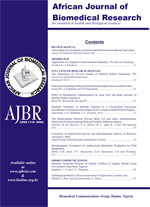
|
African Journal of Biomedical Research
Ibadan Biomedical Communications Group
ISSN: 1119-5096
Vol. 21, No. 2, 2018, pp. 123-131
|
 Bioline Code: md18021
Bioline Code: md18021
Full paper language: English
Document type: Research Article
Document available free of charge
|
|
|
African Journal of Biomedical Research, Vol. 21, No. 2, 2018, pp. 123-131
| en |
Multilevel analysis of psychosocial functioning of Adolescents in families affected by HIV/AIDS in Benue state, Nigeria
Akpa, O.M.
Abstract
Psychosocial functioning is increasing a public health priority issue among young people. Previous reports have focused on the
effect of personal health conditions on the psychosocial well-being of children but contextual analysis of environmental or social
factors could provide relevant information for interventions. In the context of HIV/AIDS, the present study examined the
personal- and contextual-level predictors of Psychosocial Functioning Index (PFI) among adolescents in Benue state, Nigeria.
Data on 2,276 adolescents was extracted from a cross-sectional study in Benue State for secondary analysis. The PFI was obtained
using the final score of an existing scale (Adolescents Psychosocial Functioning Inventory). Participant’s characteristics were
summarized using descriptive statistics and compared using Chi-square test. Multilevel logit models were used to assess the
individual- and contextual-level predictors of the PFI of adolescents. A nominal p-value ≤0.05 was considered significant in all
analyses. Participants were 14.77±2.04 years old and mostly female (53.9%). About 19% of the participants have single parents
while 62.1% have self-employed mothers. Proportion with elevated PFI was significantly higher among adolescents who have
self-employed mothers (84.4%) and alcohol/substance users (82.7%). In adjusted analysis, adolescents who reported
alcohol/substance use (OR=1.65; 95%CI: 1.14 to 2.38) were twice more likely to have elevated psychosocial functioning index
compared to non-users. The psychosocial functioning index is high among study participants and differs contextually.
Adolescent’s psychosocial functioning depends on their life styles and parents’ marital and economic situations. Family
empowerments and other family level intervention programmes will benefit adolescents in these categories.
Keywords
Psycho-social functioning; Adolescents; Psychosocial problems; Families affected by HIV/AIDS; Multilevel analysis; HIV/AIDS
|
| |
© Copyright 2018 - African Journal of Biomedical Research
|
|
